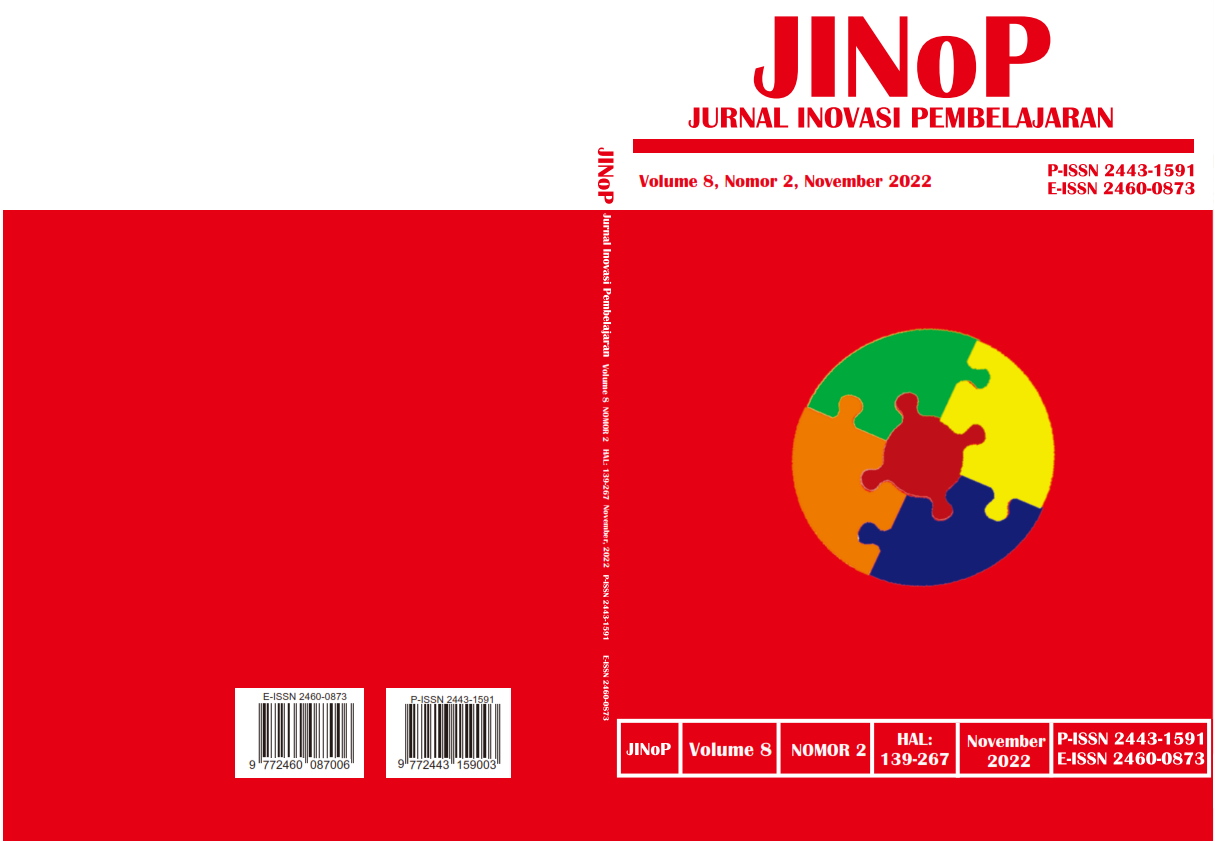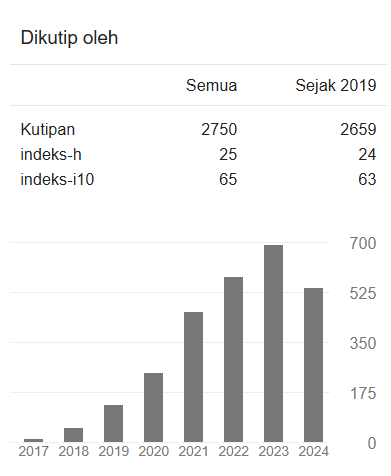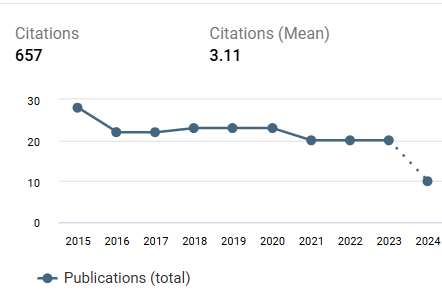The development of flashcard media to improve students’ english vocabulary in english lessons at Islamic elementary school
DOI:
https://doi.org/10.22219/jinop.v8i2.22521Keywords:
Research Development, Flashcard Media, English VocabularyAbstract
This study aims to determine how to develop appropriate and effective flashcards and to find out whether flashcards can improve students' English vocabulary. The developed media is flashcards. The subjects in this study were fourth-grade students of SD MIS Nurul Hidayah Medan. This type of research was R & D research using a 4-D model. Finding out the feasibility of the media is obtained from an expert validator. Meanwhile, finding out the effectiveness of the media is obtained by testing the media. The trial was carried out twice. The trial was conducted on fourth-grade students consisting of 30 students. Based on the conclusion of the expert, it was stated that the flashcard is worthwhile and effective. While based on the results of the students’ assessment test on the flashcard showed that there was an increase in students' English vocabulary in the first and second trials. Thus, it can be concluded that the development of flashcard as media is feasible and effective for students to use in the teaching and learning process.
Downloads
References
Abdullaha, S.I.S.S. and Halima, L. (2010) ‘Development of instrument measuring the level of teacher’s pedagogical content knowledge (PCK) in Environmental Education’, in Procedia - Social and Behavioral Sciences, pp. 174–178. Available at: https://doi.org/10.1016/j.sbspro.2010.12.131.
Abidah, L. et al. (2022) ‘Improving Distance Learners’ Writing Skills Through Comic Strip Creation: A Project-Based Learning’, EDUKATIF : JURNAL ILMU PENDIDIKAN, 4(4), pp. 5954–5962. Available at: https://doi.org/10.31004/edukatif.v4i4.3520.
Ardiansyah, D. (2019) ‘Pengembangan Multimedia Pembelajaran Vocabulary Materi Buah-Buahan Berbasis Mobile Pada Mata Pelajaran Bahasa Inggris Kelas III SD’, JINOTEP (Jurnal Inovasi Teknologi Pembelajaran), 5(2), pp. 69–73.
Arsyad, A. (2013) Media Pembelajaran. Jakarta: PT Raja Grafindo Persada.
Asih, R., Alonzo, D. and Loughland, T. (2022) ‘The critical role of sources of efficacy information in a mandatory teacher professional development program: Evidence from Indonesia’s underprivileged region’, Teaching and Teacher Education, 118. Available at: https://doi.org/10.1016/j.tate.2022.103824.
Asih, R.A. and Alief, L. (2022) ‘Students’ experiences and learning objectives: Implications for future online learning’, Journal of Education and Learning (EduLearn), 16(2), pp. 226–234. Available at: https://doi.org/10.11591/edulearn.v16i2.20422.
Asih, R.A. and Halisiana, H.T. (2022) ‘Enhancing students’ speaking skill through a game-based learning innovation of family game show’, JINoP (Jurnal Inovasi Pembelajaran), 8(1). Available at: https://doi.org/10.22219/jinop.v8i1.20400.
Basal, A., Toraman, M. and Celen, K.M. (2021) ‘ONCOLL: A quasi-experimental study on the effect of a web-based platform on teaching collocations’, Eurasian Journal of Applied Linguistics, 7(1), pp. 68–84. Available at: https://doi.org/10.32601/ejal.911181.
Cohen, L., Manion, L. and Morrison, K. (2018) Research Methods in Education, Sixth Edition.
Hasan, M. (2009) Pendidikan Anak Usia Dini. Yogyakarta: Diva Press.
Hidayati (2017) ‘Meningkatkan Kosakata Bahasa Inggris Anak Usia Dini Dengan Kartu Bergambar’, Al Hikmah : Indonesian Journal Of Early Childhood Islamic Education, 1(1), pp. 67–86.
Hobri (2010) Metodologi Penelitian Pengembangan Aplikasi pada Penelitian Pendidikan Matematika. Jember: Pena Salsabila.
Horby (2010) Oxport Advanced Learner’s Dictionary or Current English. New York: Oxford University Press.
Hung, H.T. et al. (2018) ‘A scoping review of research on digital game-based language learning’, Computers and Education, 126, pp. 89–104. Available at: https://doi.org/10.1016/j.compedu.2018.07.001.
Kashiwagi, K. and Tomecsek, J. (2015) ‘How CLIL Classes Exert a Positive Influence on Teaching Style in Student Centered Language Learning Through Overseas Teacher Training in Sweden and Finland’, Procedia - Social and Behavioral Sciences, 173, pp. 79–84. Available at: https://doi.org/10.1016/j.sbspro.2015.02.034.
Kemendikbud (2013) Pendekatan scientific (ilmiah) dalam pembelajaran. Jakarta: Pusbangprodik.
Rogers, J. et al. (2021) ‘The creation and application of a large-scale corpus-based academic multi-word unit list’, English for Specific Purposes, 62, pp. 142–157. Available at: https://doi.org/10.1016/j.esp.2021.01.001.
Rohman & Amri (2013) Strategi dan Desain Pengembangan Sistem Pembelajaran. Jakarta: Prestasi Pustaka.
Rumidjan, dkk (2017) ‘Pengembangan Media Kartu Kata untuk Melatih Keterampilan Membaca Permulaan Pada Siswa Kelas 1 SD’, Jurnal Sekolah Dasar, 26(1), pp. 62–68.
Sanjaya, W. (2011) Strategi Pembelajaran Berorientasi Standar Proses Pendidikan. Jakarta: Kencana.
Scoot Wendy A dan Lisbeth H. Ytreberg (2004) Teaching English to Children. Edited by Longman. New York.
Suyanto (2008) English For Young Learners. Jakarta: Bumi Aksara.
Suyanto, A.J. (2013) Menjadi Guru Profesional. Jakarta: Erlangga.
Tanu Wijaya, T. (2020) ‘How chinese students learn mathematics during the coronavirus pandemic’, IJERI: International Journal of Educational Research and Innovation [Preprint], (15). Available at: https://doi.org/10.46661/ijeri.4950.
Wahyuningtyas, D. et al. (2022) ‘an Analysis of the English Speaking and Writing Skill Level of’, 5, pp. 1–15.
Downloads
Published
How to Cite
Issue
Section
License
Copyright (c) 2022 Nasution et al

This work is licensed under a Creative Commons Attribution 4.0 International License.
Copyright Notice
Authors who publish with JINoP (Jurnal Inoasi Pembelajaran) agree to the following terms:
- For all articles published in the JINoP (Jurnal Inovasi Pembelajaran), copyright is retained by the authors. Authors give permission to the publisher to announce the work with conditions. When the manuscript is accepted for publication, the authors agree to the automatic transfer of the publishing right to the publisher.
- Authors retain copyright and grant the journal the right of first publication with the work simultaneously licensed under a Creative Commons Attribution 4.0 International License. that allows others to share the work with an acknowledgment of the work's authorship and initial publication in this journal.
- Authors are able to enter into separate, additional contractual arrangements for the non-exclusive distribution of the journal's published version of the work (e.g., post it to an institutional repository or publish it in a book), with an acknowledgment of its initial publication in this journal.
- Authors are permitted and encouraged to post their work online (e.g., in institutional repositories or on their website) prior to and during the submission process, as it can lead to productive exchanges, as well as earlier and greater citation of published work (See The Effect of Open Access).








